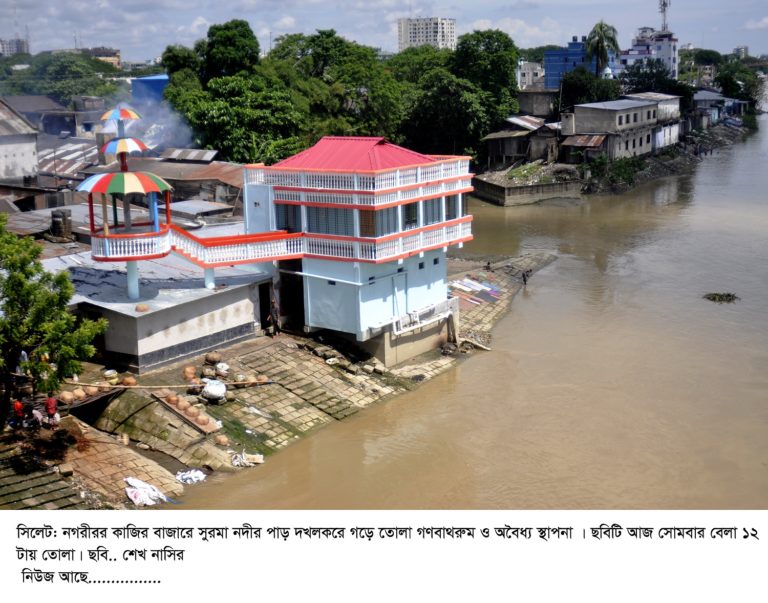
Written by Sharif Jamil, Coordinator, Waterkeepers Bangladesh
After numerous protests from Surma River Waterkeeper, other green voices, local people and repeated reporting by national newspapers, the Sylhet district administration began demolishing the notorious toilets from the east bank of the Surma River. The toilets were built in June by Kazirbazar Matsya Arotdar Samity (Kazirbazar Fisheries Agent Association) inside a luxurious structure for the fish traders of the area. There were eight such toilets, from which the human wastes were directly released into the Surma River, a river that is an integral part of the country’s history and culture, but already under constant threats due to over-development and pollution.
On top of those threats, the threat posed by the toilets along its bank, less than half a kilometer from the Sylhet City Corporation (SSC), was notorious. Initially, SSC was reluctant to take any step regarding the matter. Surma River Waterkeeper brought this to the attention of the media by providing pertinent information to the Sylhet bureau chief of the largest national Bengali daily, the Prothom Alo, which published the first report on 21 June, 2016. In addition to the series of reports by the Prothom Alo, the leading national English daily of Bangladesh, the Daily Star, published several news reports on the illegal toilets and Surma River Waterkeeper protested the existence of the toilets vehemently. On September 10, the Daily Star reported a story with the headline “Toilets occupying river land, a new way to kill Surma in Sylhet,” that highlighted the pollution caused by those toilets. It subsequently ran a follow-up urging that the toilets be removed by September 30.
After those reports were published by such influential newspapers, the Sylhet City Corporation committed to demolishing the toilets quickly. However, Surma River Waterkeeper found that the city corporation was not taking any steps to launch the demolition as the location of the toilets were under the jurisdiction of the district administration. So, Surma River Waterkeeper started a social movement together with other green voices like Save the Heritage and Environment and Bangladesh Paribesh Andolon (BAPA), Sylhet Chapter. Eventually, a team of civil society leaders and green activists formed by the Surma River Waterkeeper met the Deputy Commissioner (DC) of Sylhet district to hand over a memorandum where the activists demanded the demolishing initiative be undertaken within 24 hours. Finally, the Sylhet district administration responded to that and on October 5th, they started the demolition under the direction of Executive Magistrate Nurul Huda.
After the demolition of the illegal toilets, the warriors of the movement were overwhelmed with joy. “We thank the newspapers for creating such public awareness,” said Enamul Habib, chief executive of Sylhet City Corporation. Abdul Karim Kim, Surma River Waterkeeper and General Secretary of Bangladesh Paribesh Andolon (BAPA), Sylhet chapter, said, “It was a successful operation. But steps should have been taken sooner.” Abdul Hye AL-Hadi, chief executive, Save the Heritage and Environment, said, “The toilets were constructed violating the prevailing rules pertinent to environmental conservation and due to negligence of the local administration. We hope, they will be more vigilance in the future.”